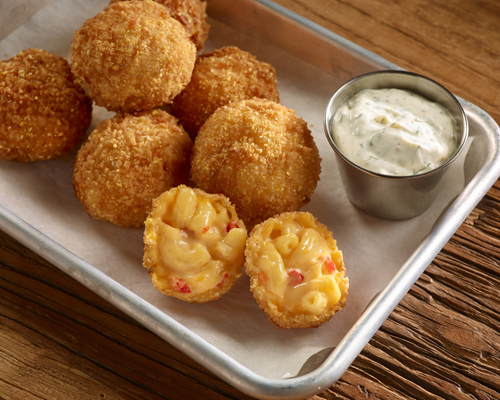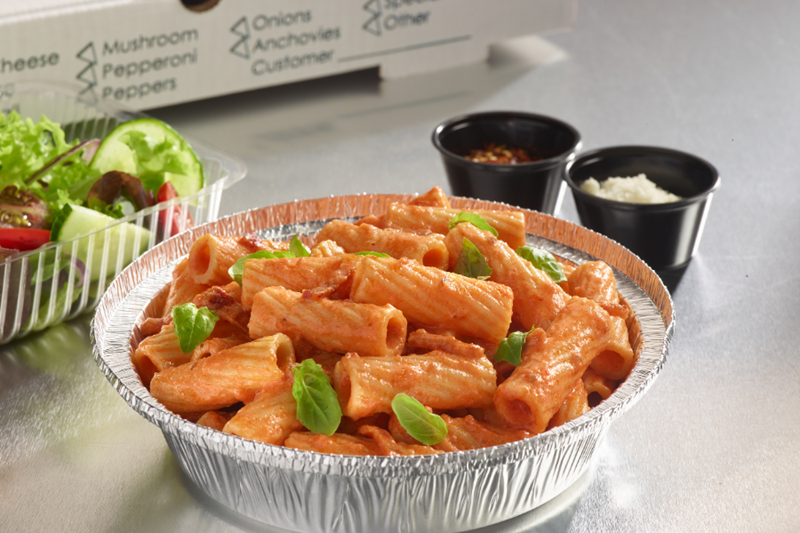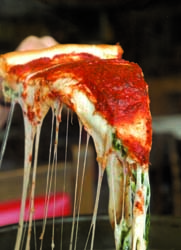Dallas might be known more for its Cowboys, barbecue and Southern charm than its pizza scene, but a handful of upscale operators are set on turning that around. Among them is Joseph Palladino, a restaurateur who –– with two other concepts under his belt — seems to be hitting all the right buttons with his four-store Coal Vines. This pizzeria is more than just a slap-a-slice-on-a-plate operation. Palladino, a former New Yorker, wanted to marry sophisticated food with an affordable and interesting wine list –– and it worked. With $10 million in sales, Coal Vines has quickly established itself amongst Dallas’ competitive and growing upscale dining scene.
The concept is part of a restaurant group that includes a steakhouse (opened in 1999) and a grill (opened in 2009) and employs 150 people. Pizza “was something that I’d been looking to do for a while,” Palladino says. “Back when we opened up in 2006, there was this wine craze starting with a lot of boutique wine restaurants and wine bars. … To me, (Dallas) was also missing good pizza. I didn’t feel the pizza was up to speed here in Dallas, and that’s something I grew up with. I’m from New York, born and raised. I’m a retired New York police officer, and I grew up with pizzerias on every corner. It was something that I missed.”
The first Coal Vines opened in uptown Dallas with just 1,600 square feet. It expanded two years later when the business next door vacated the premises. Palladino says he researched coffee giant Starbucks’ concept as an upscale experience but he also wanted that “Cheers” neighborhood environment. “I would say that’s what we accomplished here,” he says.
Important to the brand are its display kitchens, giving customers a full view of prep and baking. But Coal Vines takes its décor to another level –– there are plush drapes on the walls, Ralph Lauren fabric-covered seats, full shelves of wines and stemware on the tables. “It’s sexy,” Palladino says. “I guess the best way to explain it is (that) it’s a casual elegant setting.” Coal Vines appeals to families in the early evening, but at night it becomes a great date spot “that’s very adult driven” he adds.
The idea hits a high note in Dallas. Coals Vines now has four locations and expects to open a fifth this month. As with any concept, “once I felt that the restaurant itself was sound and that I thought that the longevity of this concept was not going anywhere, that I can remove myself from it and try it in another location, that’s when I knew” the brand could support a second store, Palladino says. “Being in the industry a long time, I have a pulse on where we are operationally … creating an institution in town. I believe we are there, and in our industry, I think that’s probably the hardest thing to achieve.”
With two successful non-pizza concepts, Coal Vines added touches not normally found in a typical pizzeria –– namely presentation and menuing upscale dishes that transcend pizza and breadsticks. Head chef and Co-owner Samir Dhurandhar, a graduate of the Culinary Institute of America, has been instrumental in the growth and development of all three of the company’s concepts and has managed to infuse Coal Vines’ menu with items like the Smoke Salmon Tartare (featuring salmon, goat cheese, avocado and pomegranate vinaigrette) and Lemon Sole Piccata, a fish dish in a lemon white wine sauce with capers and sautéed spinach. “Everything has a culinary twist to it,” Palladino says. “What we want to do is exceed everyone’s expectations.”
Pizzas are baked in a gas-assisted coal oven that cooks at 675 F. The bottom of the oven is heated with infrared, and the oven can bake eight larges at 2½ minutes each. “I was the first person in Dallas to have the original coal oven pizza, which I am familiar with in New York City,” Palladino says, quoting NYC staples Patsy’s, Lombardi’s and Arturo’s as his inspirations. “I just think it makes for a better pie.”
They haven’t changed their price points since the restaurants opened, and Palladino says sales have only increased since then. “I think people are still choosing to dine” despite the economy, he says, “and they want to go where there’s value and maybe at the same time, exceed their expectations. I think that’s why people come here.”
Part of what separates Coal Vines from its competitors –– pizzerias and upscale eateries –– is its list of more than 100 wines. Since the restaurant does a high volume both by the glass and bottle, distributors are more likely to offer them a discount. “If I do a million (in sales), $400,000 of it is going to be in wine,” says General Manager Jeff Ganji. “We do that much.”
Dallas’ wine scene was growing in 2006, and marrying pizza and wine gave Coal Vines a leg up. “In pizzerias, there’s a limitation on revenue,” Palladino says. “Everybody loves wine. Having pizza be the core competency of the brand, (we also) have a full menu as well. I wanted to make it recession proof (with) good price points.
“The wines are very heavily discounted from what you’d normally see. I also made the wines very mainstream names where I think (consumers) could appreciate the value in the wine … The wines, at this price point, I think raises everyone’s palates. People who normally spend $30 on a bottle of wine, they get an opportunity –– for the same money –– to pick up a bottle that’s normally maybe $50 or $60. They maybe even order a wine that’s a little more expensive because normally it’s out of their price range.”
Beer is available, but none of the locations sell hard liquor because Palladino says it brings in a different crowd.
As for marketing, Palladino says they don’t do any advertising except for a billboard they have in town that advertises their brunch. They opt for great customer service that generates word-of-mouth. “If we want to allocate dollars to marketing or advertising, we really do it within the restaurant,” he says. “We give it to our guests. We know where it’s going, and we feel we benefit from it that way.
“That doesn’t mean I’m right –– but it works well for us not just for this concept, but for all of them.”
There’s more to Coal Vines’ success than good food and a killer wine list, however. “Having key people in each location has been a real luxury,” Palladino says, crediting his partner, Dhurandhar, and general managers like Ganji for easy operations.
Future growth for the pizzeria concept will be done through licensing agreements, and two have been sold –– one group is slated to build 10 in Texas and a second in Kansas City.
There is still room to grow in Dallas as well. “There’re still pockets here that I don’t think we would cannibalize ourselves,” Palladino says. “It’s important that the integrity of the concept remains the same, but like anyone else that does licensing agreements, these are challenges that we face. But, we feel we have enough support, enough infrastructure, to make sure that the quality doesn’t change in any way.”
Mandy Wolf Detwiler is managing editor at Pizza Today.



